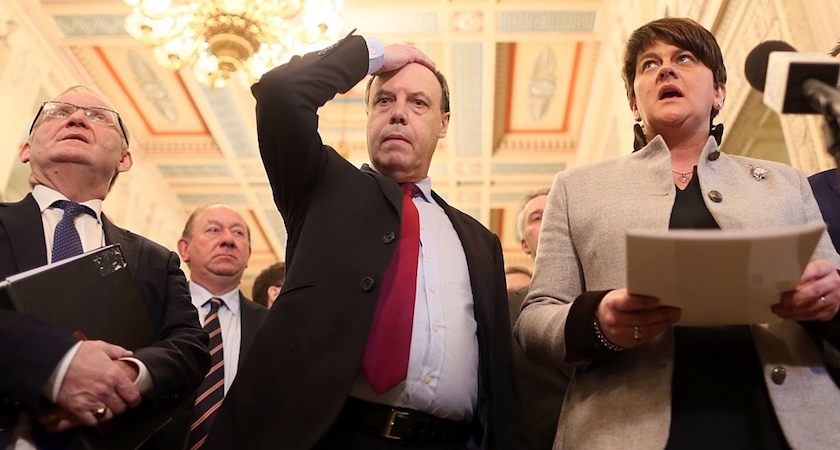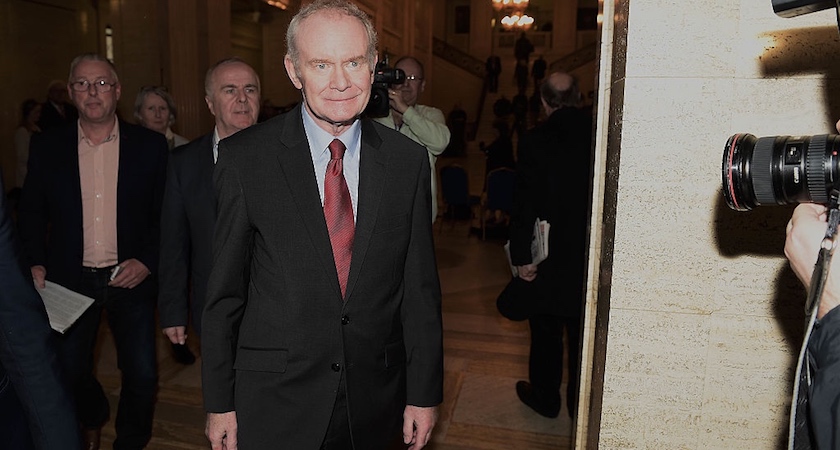NORTHERN IRELAND has been plunged into political uncertainty as Sinn Féin refused to nominate a new Deputy First Minister today, thus triggering an election.
Martin McGuinness resigned his post last week in protest over the ‘cash for ash’ scheme — a renewable energy policy called the Renewable Heat Incentive (RHI) which looks set to lose millions of pounds.
Mr McGuinness resigned after Arlene Foster refused to step down while an enquiry was conducted into the affair. But his resignation is only the latest in a long series of disagreements with the partners in government.
Sinn Féin MLA Michelle O'Neill said: "Sinn Féin will only be part of institutions which work and deliver for all in the community. There can be no return to the status quo.
"If something is broken, you stop and you fix it."
 Deputy Leader of the DUP Nigel Dodds gestures as DUP leader Arlene Foster speaks to members of the media in the Great Hall at Stormont before the start of the Assembly in Belfast. (Picture: Paul Faith/AFP/Getty Images)
Deputy Leader of the DUP Nigel Dodds gestures as DUP leader Arlene Foster speaks to members of the media in the Great Hall at Stormont before the start of the Assembly in Belfast. (Picture: Paul Faith/AFP/Getty Images)An election to the Stormont Assembly became mandatory under the terms of the Good Friday Agreement after Martin McGuinness resigned as Deputy First Minister.
The Northern Secretary James Brokenshire has now called the election for March 2.
He said: "I am now obliged under relevant legislation to propose a date for the next Northern Ireland assembly election.
"The election seeks to have the views of the future of Northern Ireland and bring people back together again and assures those lines of communications maintain open."
Irish Minister for Foreign Affairs Charlie Flanagan also called for calm.
“I spoke with Secretary of State Brokenshire on this matter this afternoon, and we agreed that both Governments should continue to work closely together in the weeks to come, looking ahead to the post-election period, when a new power-sharing Executive will need to be formed," he said.
“In this regard, as the Assembly election campaign gets underway, I reiterate my call to all parties in the election to act responsibly in word and deed so that the political institutions of the Good Friday Agreement will not be damaged in the longer term.
He added: “As a co-guarantor of the Good Friday Agreement, the Irish Government will continue to work with the British Government and the political parties to advance political stability, reconciliation and economic prosperity in Northern Ireland."
Mr McGuinness, who is reported to have been suffering ill health, has not made it clear whether he will lead Sinn Féin into the election.
Before the Monday deadline, Theresa May held talks separately with First Minister Arlene Foster and Martin McGuinness in an attempt to avoid an election, but to no avail.
 Former Deputy Northern Ireland First Minister Martin McGuinness walks through the Great Hall at Stormont after failing to nominate a candidate for the role of Deputy First Minister on January 16 (Picture: Charles McQuillan/Getty Images)
Former Deputy Northern Ireland First Minister Martin McGuinness walks through the Great Hall at Stormont after failing to nominate a candidate for the role of Deputy First Minister on January 16 (Picture: Charles McQuillan/Getty Images)The outcome of the election is unlikely to be hugely different from the previous one.
The two main parties - Sinn Féin and the DUP - have lost little support to their main rivals, the Ulster Unionist Party and the SDLP.
There is an outside chance that Sinn Féin could became the biggest party, which would have huge implications for the jurisdiction.
However, most commentators seem to believe this is one of the least likely outcomes.
If stalemate continues after the election the North could be in for an extended period of direct rule from Westminster.
It has been argued that this will be politically destabilising, particularly as the Northern Ireland voted by a clear majority to remain in Europe, while the Westminster Government is pursuing the Brexit option.

